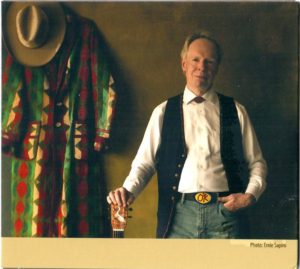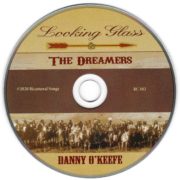Looking-Glass and the Dreamers – Danny O’Keefe
More Than a CD: American History in a Melodic Narrative

Killers of the Flower Moon is the big news of 2024. The movie was nominated in 10 Academy Awards categories and won numerous awards throughout the film industry. Lily Gladstone has become a household name. It seems that average Americans are ready to hear the part of America’s history that collides with the indigenous peoples of our continent.
now the buffalo’s gone / soon the trees and the grass
Do you want more? Let me tell you about Looking-Glass and the Dreamers, an album by singer-songwriter Danny O’Keefe.
If you don’t know the name, Danny O’Keefe is possibly the finest songwriter you don’t know about. His biggest hit is Goodtime Charlie Got the Blues. But he spent years carefully unearthing a story that came to him in a dream. Looking Glass and the Dreamers, released in 2020, is a novel in music as poignant as the movie everybody’s talking about. This is the CD that stays in my deck, the one I listen to when I want to feel a broken heart.
Can white guys write fairly about what really happened? O’Keefe created a companion book about his research trail. He’s coming at this as a local, frank about his personal history with native people in his childhood. He says the Looking Glass he meant to write about was Alice’s…but then he fell asleep. From the book:
I was trying to write a song using metaphors or twists on the
allegories of Alice à la Through the Looking Glass. Unable to
connect the allegories in any meaningful way, I drifted into
sleep and dream. As I was waking to the room, I was given the
words: “Looking Glass in Oregon, one night had a dream … Of
soldiers slowly riding in a solemn, endless stream.” And that’s
how it began. A mirror was being held up to me…and a lens.
The pacing brings us directly into and through the narrative: rhythm, tension, threat, temporary triumph, loss, and as much peace as one can have after losing a collective life. That lens focuses for us on intimate settings as well as the broad, bloodied horizon. The second track, Looking Glass, is sweet in melody but intimates some prescience as Looking Glass tells his wife (and us) about a dream he had. Also, we’re invited to be empathetic:
Don’t you feel just a little / Like Looking Glass?
The book will tell you where O’Keefe got his information; he chronicles the proving, the acceptance, the doubt he received from families of people he wrote about. The word “appaloosa” appears once in song, but the book tells you of O’Keefe’s fruitless search to find descendants of the most famous line of Nez Perce horses.
The Appaloosa feels my hands upon the reins / Dream Riders crossing endless plains
Native voices are included in this record, Milton “Quiltman” Sahme in the literal sense; women’s voices. Soldiers and generals give their perspectives in concise lines of dialogue skillfully portrayed from the character’s POV, leaving us to make our own conclusions on motive.
Howard said to Joseph, “I mean to have your land/ and I can drive you from it, you will come to understand.”
Jackson Sundown is probably my favorite – his story is one that happened after the massacre, helping us to understand how survivors have to live on. This history is not dead and gone, but it’s no longer rooted where it was born. O’Keefe gives locations you can easily map. Most of us have heard Chief Joseph’s famous quote:
From where the sun now stands, I will fight no more forever.
O’Keefe paints a context around it in music. He is a painter of sound.
O’Keefe is a brilliant writer, lyrically and otherwise. Each word is chosen to carry its weight. His care with language and scansion eases my brain. By example, I offer the hardest-hitting bit of lyric I’ve ever known, from Wild Swan:
God damn the hunter ever shot a swan
What’s really understated is O’Keefe’s prowess as a guitarist. Rapt in the story, it’s hard to listen for how skillfully he plays silky music that softens the unfolding terror. You can be told an event was horrific, but he makes you feel it. Here’s a chance to internalize how and why things happened that did. I don’t know whose truth it is, but it feels very close to real. Don’t you feel a little like Looking Glass?
And Looking Glass began introducing me to others. He
introduced me to Chief Joseph (Hinmahtooyahlatkekt), and to
Yellow Wolf (Hemene Mox Mox), and a cast of performers in a
seminal American tragedy: This story, the story of the Nez Perce
and the War of 1877 and beyond.
Danny O’Keefe recently released Circular Turns, a double album curated by Len Fico. The first disc comprises studio recordings (my favorite is Magdalena, because I get her) and the second contains live recordings, complete with banter, heckling, and the backstory of “Well, Well, Well,” co-written with Bob Dylan. Anybody watch the NASA channel?
Buy Looking Glass and the Dreamers (and the book) here.
Also, I have a hard crush on this guitar.
Looking-Glass and the Dreamers – Danny O’Keefe
More Than a CD: American History in a Melodic Narrative













